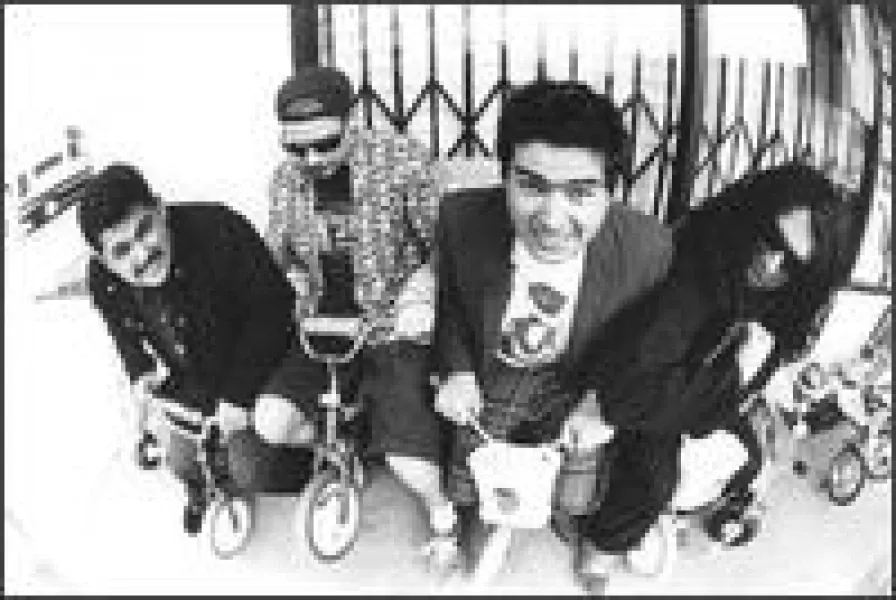
Nofx
Top Nofx albums
Top Nofx lyrics
Nofx biography
Formed in Berkeley, CA, in 1983 and relocating to Los Angeles not long afterwards, NOFX steered clear of major labels and commercial exposure over the course of their career, recording an impressive number of full-lengths albums plus an a**ortment of EPs and singles. The band started out as a trio comprising vocalist/ba**ist Fat Mike (Mike Burkett), guitarist Eric Melvin, and drummer Erik Sandin (aka Erik Ghint/Erik Shun). Sandin quit in 1985, and his place was taken by Scott Sellers; that same year, NOFX also recorded two 7" EPs for the Mystic label, No F-X and So What If We're on Mystic? Sellers quit shortly thereafter and was replaced by Scott Aldahl for only two weeks, upon which point Sandin re-joined the band; vocalist Dave Allen also joined in 1986, but his tenure was tragically cut short by a fatal car accident. Dave Casillas joined as a second guitarist later in the year, by which point NOFX's touring schedule had become far-ranging and rigorous. The EP The P.M.R.C. Can s** on This was released on Fat Mike's own Fat Wreck Chords label in 1987. Casillas departed the group in 1989 and was replaced by Steve Kidwiller for NOFX's first full-length album, S&M Airlines, which was released on the legendary punk label Epitaph; the band remained there ever since, despite the release of several albums -- such as 1995's I Heard They s** Live -- and EPs on Fat Wreck Chords, which gradually grew into a premier stable of punk revival artists.br /br /Having appeared on 1990's Ribbed and 1991's Liberal Animation (which was actually recorded in 1988), Kidwiller left the band in 1991, and Aaron Abeyta became the permanent second guitarist (as well as trumpeter), adopting the nickname El Hefe. Dragged into the mainstream spotlight by the mid-'90s success of labelmates Bad Religion and the Offspring, NOFX compensated with albums like 1992's White Trash, Two Heebs and a Bean that were even closer to the anti-commercial extreme; exemplified by White Trash's accompanying single "Please Play This Song on the Radio," which lured un-alert radio programmers with a tight melody, but ends with a stream of obscenities. The El Hefe-anchored lineup continued to blossom with 1994's Punk in Drublic; often regarded as the band's best, the album was eventually certified gold. Releases on Fat Wreck Chords continued throughout the '90s, as did the full-length Epitaph albums, like 1996's grungier, less up-tempo Heavy Petting Zoo, 1997's punkier So Long & Thanks for All the Shoes, and 2000's Pump Up the Valuum and Bottles to the Ground; the latter album followed an experimental Fat Wreck Chords EP titled The Decline, which consisted entirely of the 18-minute title track. Next up was the Surfer EP, which showcased select sloppy cuts in spring 2001, the first 500 copies on colored vinyl. br /br /In 2002, NOFX sifted through countless tapes and recording sessions, eventually collecting 47 songs for 45 or 46 Songs That Weren't Good Enough to Go on Our Other Records. "Pimps and Hookers," which was the only new song on the album, was recorded in one day. Later that year, BYO Records got the band to release the NOFX/Rancid split album BYO Split Series, Vol. 3. This particular album had Rancid covering six NOFX tracks while NOFX returned the favor by switching up six Rancid songs. The four-song EP Regaining Unconsciousness came out in March 2003 and served as a teaser for May's The War on Errorism, released on Fat Wreck and littered with political criticisms. With the band's outspoken and leftist nature, it was then not surprising when they launched Punk Voter, a movement of punk bands that sought to politically empower disenfranchised youth and vote George W. Bush out of office. The organization still remained in action, even after Bush's 2004 re-election. Back on the music front, NOFX next released the EP Never Trust a Hippy in March 2006, and the full-length Wolf in Wolves' Clothing followed a month later. ~ John Bush & Steve Huey, All Music Guide
